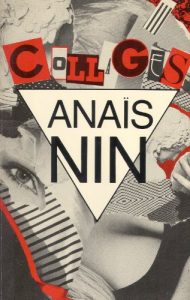Collages is Anaïs Nin’s last work of fiction, and is, as the title suggests, a collection of interwoven stories, opening and closing with the passage: “Vienna was the city of statues. They were as numerous as the people who walked the streets. They stood on the top of the highest towers, lay down on stone tombs, sat on horseback, kneeled, prayed, fought animals and wars, danced, drank wine and read books made of stone.”
The central character, Renate, is a sort of “master of ceremonies” for Nin’s modern fairy tales, as she floats through the narrative and communes, in one way or another, with each of the “storytellers.” Among them are: Varda, the artist whose interaction with his daughter causes him to spin story upon story in order to win her over to his artistic way of thinking; Henri the chef, who names each of his dishes after celebrities and has stories for the most interesting of them; Nina, a young woman whose spontaneous musings lead casual observers to believe she is insane; Nobuko, the Japanese actress whose charming commentaries and letters are laden with magical yet incorrect English; Bruce, whose betrayals to Renate with boys are written in story form hidden in Chinese puzzle boxes; Count Laudromat, the exiled royal whose father-in-law is an owner of laudromats; the French Consul and his wife, who are writers with extremely different outlooks on love and passion; John Wilkes, the “millionaire patron of the arts” who is actually a gardener; Dr. Mann, an Israeli with the unusual pastime of meeting and kissing famous women authors; and the enigmatic Judith Sands, who may have actually “written” Collages.
Collages is Nin’s most light-hearted writing, and, in that sense, is perhaps her most entertaining book. As Henry Miller commented, “The best of collages fall apart with time; these will not.”
The central character, Renate, is a sort of “master of ceremonies” for Nin’s modern fairy tales, as she floats through the narrative and communes, in one way or another, with each of the “storytellers.” Among them are: Varda, the artist whose interaction with his daughter causes him to spin story upon story in order to win her over to his artistic way of thinking; Henri the chef, who names each of his dishes after celebrities and has stories for the most interesting of them; Nina, a young woman whose spontaneous musings lead casual observers to believe she is insane; Nobuko, the Japanese actress whose charming commentaries and letters are laden with magical yet incorrect English; Bruce, whose betrayals to Renate with boys are written in story form hidden in Chinese puzzle boxes; Count Laudromat, the exiled royal whose father-in-law is an owner of laudromats; the French Consul and his wife, who are writers with extremely different outlooks on love and passion; John Wilkes, the “millionaire patron of the arts” who is actually a gardener; Dr. Mann, an Israeli with the unusual pastime of meeting and kissing famous women authors; and the enigmatic Judith Sands, who may have actually “written” Collages.
Collages is Nin’s most light-hearted writing, and, in that sense, is perhaps her most entertaining book. As Henry Miller commented, “The best of collages fall apart with time; these will not.”






